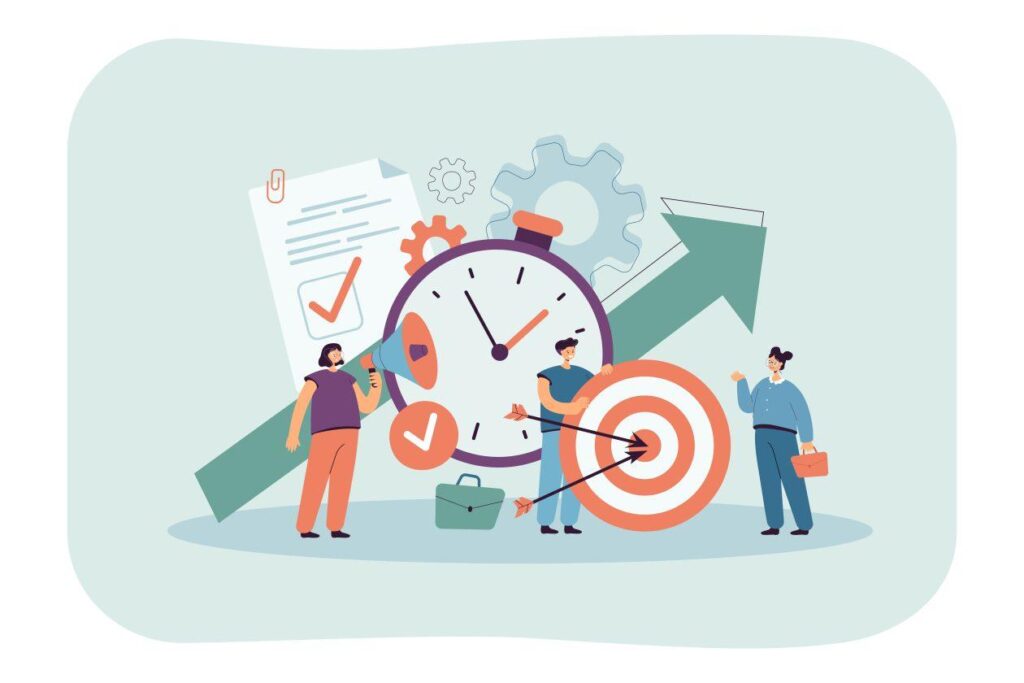Introduction
The idea of time management frequently takes center stage in the fast-paced modern world, with innumerable books, seminars, and productivity tips promising to assist people in making the most of their limited time. But looking more closely, you’ll see that “managing” time is fundamentally incorrect. Time is an unchangeable constant that passes by for everyone at the same rate despite their best attempts to stop it.
We must keep the basic structure of time the same, no matter how hard we try; there will always be 24 hours a day, seven days a week, and 365 days a year. Therefore, the idea that we can “manage” time in any way is a trickery illusion that, when deadlines loom big and activities stay unfulfilled, breeds irritation and a sense of helplessness.
Rather than making pointless efforts to control time, we must change our viewpoint and acknowledge that time is a constant. The key to solving this problem is not time management per se but choosing wisely how to spend our time. By redefining “choice management,” we give ourselves the authority to accept responsibility for our choices and actions while working under time restrictions. This mental adjustment enables us to concentrate on what counts: establishing priorities, creating objectives, and managing our time effectively to increase output and satisfaction. We shall examine different methods of utilizing time’s inherent value and go deeper into the myth of time management in the following parts.
Debunking the Myth of Time Management
We frequently lose sight of the fact that time is an unchanging constant in our pursuit of efficiency and production. No matter how hard we try, we cannot change the fundamental structure of time itself. A day consists of 24 hours, a week consists of 7 days, and a year consists of 365 days. It is essential to comprehend this basic fact to dispel the misconception about time management. We need to learn to realize that time is something we cannot modify, and instead of wasting our time trying to manage it, we should concentrate on how we choose to spend the time we have.
The idea of “managing” time suggests an unreal degree of control. Time is a social construct humans have imposed upon the inevitable course of events; it cannot be altered or controlled. Time is something we cannot stop, no matter how hard we try to prioritize our work and manage our schedules. We can release ourselves from the shackles of arbitrary deadlines and exaggerated expectations by realizing the fallacy of time management, which makes room for a more adaptable and flexible approach to production.
We should change our emphasis from time management to “choice management.” This entails wisely choosing how to spend our time and energy according to our priorities and ideals. By reinterpreting choice management, we enable ourselves to accept responsibility for our choices and actions while working within time restrictions. This mental adjustment lets us prioritize our work and match our actions to our long-term objectives and desires. Ultimately, by changing our approach to time management, we can achieve higher levels of productivity, fulfillment, and general well-being in our lives.
Embracing the Power of Choice
The idea of “choice management” comes to light in the field of time management as a novel take on the traditional wisdom of time control. Acknowledging the unchanging nature of time, people can regain control over their actions by concentrating on the decisions they make within the limitations of time. This mentality change allows people to take responsibility for their choices, priorities, and behaviors, promoting independence and control over their lives. People can overcome the constraints placed on them by the delusion of time management and live more meaningful and purposeful lives by embracing their power of choice.
Strategies for Effective Choice Management
- Setting Priorities: Steven Covey’s Quadrants Revisited
Steven Covey’s timeless framework of quadrants offers valuable insights into prioritizing tasks based on their urgency and importance. By categorizing tasks into four quadrants – essential and urgent, important but not urgent, urgent but not necessary, and neither urgent nor essential – individuals can gain clarity on where to allocate their time and energy. Emphasizing tasks in the “not urgent but important” quadrant enables individuals to proactively address long-term goals and aspirations, leading to greater effectiveness and fulfillment.
- Overcoming Time Constraints: Creative Solutions and Alternatives
When faced with time constraints, creativity becomes a valuable asset in managing tasks and responsibilities. Rather than succumbing to the pressure of deadlines, individuals can explore innovative solutions and alternatives to accomplish their goals. This may involve seeking assistance, extending deadlines, delegating tasks, or finding unconventional approaches to problem-solving. By embracing flexibility and adaptability, individuals can navigate time constraints with resilience and resourcefulness, ultimately achieving their objectives with greater efficiency and satisfaction.
The Social Construction of Time
How humans see and comprehend time has changed significantly throughout history. At first, natural cycles like the sun’s rise and set or the changing seasons were used to measure time. However, as civilization developed and the demand for order and coordination increased, civilizations started to measure time. Ancient societies created sundials, water clocks, and mechanical clocks to track time better. These inventions laid the groundwork for the modern idea of time management. The shift from organic rhythms to standardized measurement reflects how people become more conscious of time as a limited and measurable resource.
An important turning point in how people relate to time was reached during the Industrial Revolution. Time became increasingly a commodity as industrialization and capitalism grew, valuing resources that needed to be used as efficiently and profitably as possible. The advent of assembly lines and factory labor demanded rigorous attention to timetables and schedules, shaping society’s standards and expectations around efficiency and punctuality.
This change in how people perceive time transformed work practices and impacted social relationships, daily routines, and cultural values. People started to realize the economic value of time, which fueled the never-ending quest for productivity and time efficiency.
Time has become a precious and highly sought-after commodity in modern culture. The gig economy, globalization, and the spread of technology have all accelerated life’s pace and increased the strain of balancing conflicting commitments and objectives. People are overloaded with obligations, which causes “time poverty,” which sociologists define as the perception that one does not have enough time to achieve one’s goals and aspirations. Ironically, technologies like automation and digitalization that are meant to save time frequently increase the use of that time.
Consequently, people struggle to balance fulfilling obligations and setting aside time for fun, rest, and self-care. The intricate relationship between time supply and demand highlights the complexity of time management and the difficulties of living in a time-constrained environment.
Time Management is an Illusion
In a society where production is the primary concern, time management is essential. But there’s a severe error in the widely held notion that careful preparation and scheduling will give us control over time. We must accept that time management is a myth, not how we manage it. Realizing this allows us to refocus on appreciating time for what it truly is.
The idea that time is a resource that needs to be managed is the foundation of time management idiocy. Time is a non-fungible, ever-flowing resource that cannot be stopped, unlike money, which can be saved or controlled. We should put more effort into maintaining our priorities and choices than into managing our time. By choosing wisely how to spend our time, we can have a more meaningful and purposeful existence.
It takes a mental change toward decision management to break free from the illusion of time management. By accepting responsibility for our choices, we may empower ourselves and resist the overwhelming demand to regulate our time. This entails establishing precise priorities, developing the ability to decline unimportant tasks, and accepting the autonomy to select our activities. We can achieve more contentment and happiness in our personal and professional lives by changing our thoughts about time.
Escaping the Tyranny of Productivity

The urge to be busy in today’s fast-paced environment can put people in a productivity trap where they prioritize quantity above quality. Many people sacrifice work quality for efficiency, equating productivity with hours worked or tasks performed. This strategy, nevertheless, ignores how crucial meaningful, superior production is. Effectiveness should come before busyness in actual productivity, focusing on outcomes consistent with one’s objectives and values. People can break free from the cycle of meaningless productivity and develop a more purposeful and rewarding way of living by reconsidering what productivity means and giving quality more weight.
Conventional ideas of success frequently center on managing one’s time well and accomplishing more in less time. However, productivity measurements and deadline-driven achievements shouldn’t be the only criteria used to define success. Alternatively, one way to redefine success is as a holistic performance that includes all facets of well-being, such as mental toughness, emotional fulfillment, and physical health. Prioritizing self-management over time management allows people to focus on their development, creativity, and work-life balance. Adopting a multifaceted perspective on success enables people to find fulfillment beyond traditional productivity metrics, promoting increased contentment and general well-being.
Saying no to overcommitment is one of the most effective ways to regain control of one’s time. People frequently feel overburdened by excessive duties and commitments in a culture that values busyness and multitasking. However, saying no to unimportant obligations and chores is crucial to freeing up time and energy for the things that count. People can prevent burnout and concentrate on activities that support their objectives and values by establishing clear limits and ranking tasks according to significance and impact. Filtering obligations allows people to live more purposefully and regain control over their time, increasing contentment and well-being.
Redefining Work-Life Balance
There is a widespread misconception today that time is best used when it is very useful or purposeful. But this thinking frequently undervalues the significance of leisure, personal fulfillment, and rest. Challenging these cultural conventions takes a mental shift to value downtime and self-care as essential elements of a balanced life. When people realize that a well-spent time includes both productivity and fun, they may let go of the pressure to perform all the time and put their general well-being first.
To redefine work-life balance, mindfulness—the ability to be completely present in the moment without passing judgment—must be practiced. Being mindful helps people see the value of every experience, whether working on a project at work or spending time with close friends and family. People can lower their stress levels, improve their focus, and create stronger relationships in their personal and professional lives by accepting the present moment with attentive awareness. Including mindfulness exercises in everyday activities can make a big difference in creating a more harmonious work-life balance.
Ultimately, time is valuable for its output and ability to contribute to personal fulfillment and contentment. People can live more fulfilled lives where they can follow their passions, cultivate connections, and prioritize self-care when they manage their work and leisure obligations in a balanced manner. People can feel more content and happy in every area of their lives by redefining work-life balance as a comprehensive integration of productivity, leisure, and well-being. It is critical to understand that time is a limited resource and that our overall sense of satisfaction and fulfillment is shaped by how we spend it.
Conclusion
As we come to the end of our investigation into the myth of time management, it is essential to consider the idea that time is best embraced rather than genuinely handled. Through our journey, we have learned the mistake of trying to manage time and its more profound significance in our lives. By acknowledging the shortcomings of conventional time management strategies, people can embrace a more comprehensive outlook that emphasizes significant life events and individual welfare rather than mere output.
Realizing that time gives us choices and that our lives are shaped by how we make these decisions is fundamental to our comprehension. People can create a route to fulfillment that aligns with their values, passions, and goals by utilizing the power of choice. Accepting choice gives people the ability to have more meaningful and fulfilling lives, whether by learning to say no to overcommitment, developing mindfulness, or choosing priorities.
As we conclude, time is a valuable gift that should be appreciated and used prudently, not merely as a dimension or a measure. Every moment is a chance to change the world, build relationships with people, and follow our aspirations. Let’s treasure our time as we traverse life’s complexity and work to make the most of it—not as a controlled resource but as a gift to be welcomed with purpose and thankfulness.
Reference
(1) Pitre, C., Pettit, K., Ladd, L., Chisholm, C., & Welch, J. L. (2018). Physician Time Management. MedEdPORTAL: The Journal of Teaching and Learning Resources, 14. https://doi.org/10.15766/mep_2374-8265.10681
Was this helpful?

Joseph Emb, RDN
Founder of StyleVitally.com | Registered Dietitian & Wellness Advocate
What I Cover:
I’m passionate about connecting nutrition science and everyday wellness to help people live healthier, more vibrant lives. I write about evidence-based nutrition, mindful eating, sustainable lifestyles, and holistic well-being at StyleVitally.com.
My Background:
The University of Texas in Austin, where I earned my Dietetics diploma, laid the groundwork for my nutrition and health career. My training and hands-on experience taught me the science and art of using nutrition to enhance health and well-being.
Professional Journey:
I’m an RDN with lots of experience. I’ve helped people seeking tailored nutritional recommendations in clinical settings and community outreach programs. My constant learning and professional development ensure that my recommendations are always based on the latest evidence.
Ethical Commitment:
My practice prioritizes integrity. My content is transparent and objective, following the most significant ethical standards. I can give my audience unbiased advice because I’m not affiliated with food businesses or industry associations. I want to help people make informed health decisions that match their values and ambitions.
Join Me on the Wellness Journey:
Join me on the path to vitality and well-being, whether facing nutritional issues, seeking sustainable lifestyle changes, or simply wanting a better, happier you. We’ll discover how diet, mindfulness, and holistic well-being can maximize your potential.




